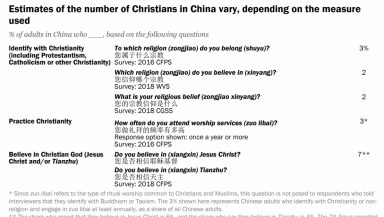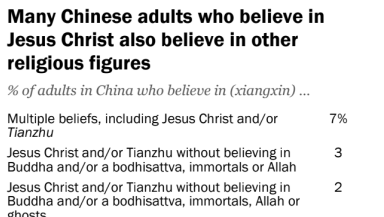
A new research project has delivered an unprecedented range of insights into the religious and spiritual practices of the world's most populous nation.
Measuring Religion in China, a report from the Pew Research Center, delivered the findings of its research as part of the Pew-Templeton Global Religious Futures project, and revealed a number of surprising findings—and a far more diverse depth of religious belief in a nominally atheistic nation than might be expected.
The report delivers an in-depth examination of the place that religion holds in hearts and minds across China, despite the difficulties faced by non-Chinese researchers who are unable to conduct surveys in China. Instead, the Pew Research Center analysed data from academic groups in China, as well as that provided by state-run religious associations and government departments.
Taking into account the poor fit of religious categories used elsewhere in the world, and the unique and distinct range of religious beliefs and customs in East Asia, the Pew Research Center considered a wide range of survey questions collected by these sources and presented data relating not only religious expressions familiar to Western conceptions of religion, but spiritual expressions such as such as gravesite visits and the belief in fengshui.

Despite the Communist nation's uneasy relationship with religious belief, and an official promotion of an atheistic worldview, many Chinese adults continue to adhere to spiritual practices, although only one in 10 formally identify with a religion. However, the report also demonstrates that the gap between those who hold spiritual beliefs - almost a third of the population - and those who admit to being religious is often driven by the different terminology used in Chinese culture.
While in the 2018 Chinese General Social Survey (CGSS) only a minority of adults surveyed identified with any religious group, the wording of the question translated as if they were being asked to declare a formal identification with a religion or system of values. It was only when the definition of religion was expanded to account for questions on spirituality, customs, and superstitions that the true breadth of spiritual beliefs in China was revealed.
As an example of the gap between practice and identification, the report found that while only 4% of Chinese adults formally identify as Buddhists, over a quarter of adults surveyed in the China Family Panel Studies (CFPS) survey burn incense on at least a few occasions a year, which would typically involve beseeching Buddha or other deities for some sort of divine intervention.

These unique challenges make it difficult for the Pew Research Center to accurately measure the extent of Christian belief in China. According to data taken from the CGSS in 2010, around 2% of adults (or 23.2 million people) self-identified as Christian. However, when this was expanded to take into account those who were willing to confess their belief in Jesus Christ, the 2018 CFPS survey found that roughly 81 million adults, or 7-8% of the population could be considered Christians. Oddly, especially to Western eyes, many of these same people who professed a belief in Jesus also shared a belief in one or more non-Christian deities, such as Buddha, Taoist deities, or Allah.
Further complicating matters is the Chinese government's often antagonistic relationship to religious belief, especially those it sees as risking widening the West's influence. The ruling Chinese Communist Party (CCP), especially under current President Xi Jinping, has instituted a policy of "Sinicization of religions", particularly impacting non-traditional religions with its crackdowns on unauthorised Protestant meeting points and underground Catholic churches. This means that many believers might be reluctant to divulge their beliefs in the face of government-backed disapproval and possible persecution.
Despite the difficulty in accurately measuring religious and spiritual engagement in China, this report from the Pew Research Center shows that despite the best efforts of the Chinese government, the Chinese people continue to search for a deeper meaning to life than provided by politics. It also shows that Christianity has maintained a place in the hearts and minds of many in the face of ongoing challenges, offering continued hope for the future of the Gospel in the world's largest nation.













